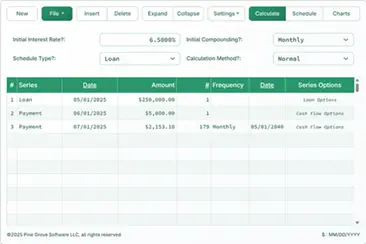Retirement Age Calculator
The Retirement Age Calculator makes it straightforward to answer the fundamental retirement question: “At what age can I retire?” The calculator requires only a few inputs. More below…
The Calculator-Calculate Projected Retirement Age
Information
Calculator Details
The calculator has 11 inputs. Six of them are required:
- Your current age
- Annual contribution toward retirement
- and/or current retirement savings
- ROI for retirement savings
- Retirement lasts how many years
- Desired retirement income
- ROI during retirement
There are five optional inputs. Any or all can remain at 0.
- Annual contribution increase
- Current retirement savings
- Income from government
- Other annual income
- Annual inflation rate
Click the [Help] button for more details about each input.
If “For retirement income, withdraw only interest” is selected, you will not be able to enter a value for “Retirement lasts how many years” because withdrawing only interest leaves the principal untouched. In theory, the income lasts indefinitely. An exception occurs if you enter an “Annual inflation rate.” In that case, only the first withdrawal equals the interest earned for the year. Later withdrawals are higher to offset inflation.
This retirement age calculator can provide useful insights into your retirement options. If the calculated age is older than you prefer, there are four main ways to reduce it:
- Increase the annual contribution
- Earn a higher rate of return on retirement savings
- Earn a higher rate of return during retirement
- Reduce the desired retirement income
Other Retirement Calculators
- Retirement Income Calculator
- Retirement Savings Calculator
- Retirement Calculator — does it all. Better on desktops or larger screens.
Retirement Age Calculator Help
Although many inputs may seem self-explanatory at a basic level, review the information below. Several details are important to understand.
Your current age — the age at which you plan to begin saving or investing.
Current retirement savings — if you have already started saving, enter the total amount currently in your retirement account.
Annual contribution toward retirement — enter the amount you plan to save each year for retirement. Generally, the older you are, the higher the contribution will need to be to reach your income goal.
Annual contribution increase — assumes your annual contribution will rise over time. Enter the average annual increase you expect (as a percentage). To account for inflation, enter a value that is less than the expected inflation rate. For example, if you plan to increase contributions by 3% per year and expect inflation to average 2%, enter 1%.
ROI for retirement savings — your expected average annual return on investments. If funds were placed in a standard savings account (not necessarily recommended), this value would equal the account’s annual interest rate.
Income from gov’t — if you expect Social Security or a government pension, enter the annual amount. This income, plus any other income sources, is deducted from “annual income required” to determine the income your savings must generate.
Other annual income — if you expect income from sources other than retirement savings and government benefits, enter the annual amount. For example, if you expect an employer pension, enter the annual pension amount. This income and Social Security are deducted from “annual income required” to determine the income your retirement fund must provide.
Retirement lasts how many years — your retirement age is calculated based on the number of years you expect to fund retirement from investments. This may seem counterintuitive at first. The longer the retirement period, the later the retirement age will be. Your investments must grow longer to fund a longer retirement.
Desired retirement income — the total annual income you expect to need at retirement, including income from other sources. The retirement age calculation is based on the time needed for investments to fund this desired income, less income from government and other sources.
ROI during retirement — the rate of return you expect on investments after retirement. You may use the same rate as “ROI for retirement savings,” but many retirees shift to more conservative assets that generate lower returns.
Annual inflation rate — if you want retirement income to increase over time, enter an estimated inflation rate. Income will rise by this amount each year.

B.W. says:
Excellent calculator….validates my Excel spreadsheet that I created to show basically the same thing. But yours is much faster, easier to input values, and shows a chart that is easy to understand and teach others.
Nice work.
Karl says:
Thank you, and thank you for taking the time to let me know.
Speaking of inputting values, I just released an update this morning to this retirement calculator that lets the user save a custom URL. They can use the URL to preload the calculator with their values the next time they try it. Nothing to enter to get started. Just edit the values that have changed. (It too will solve for retirement age.)
Nathaniel says:
Hi Karl,
Great website and calculators! Question: Do you have the WordPress plugin available for your Retirement Age Calculator? The one I installed on our commercial website is shortcode: [fcretireageplugin] however, it is not the same as shown above (https://accuratecalculators.com/retirement-age-calculator).
Thanks in advance!
Karl says:
Hi Nathaniel, thanks. I appreciate the compliment. I have only the one retirement age plugin at this time. And before you ask :-), there are no immediate plans for an update either. The website itself is taking all my time.
Nathaniel says:
Thank you for the quick response. Any chance you would have a version of code we could embed onto our website and newsletter?
Thanks in advance.
Karl says:
Nothing off the shelf. If you have a budget for development and licensing, I can support a request for a version of the calculator for your website. If you want to pursue that, you can reach me via the contract link at the bottom of any of these web pages.